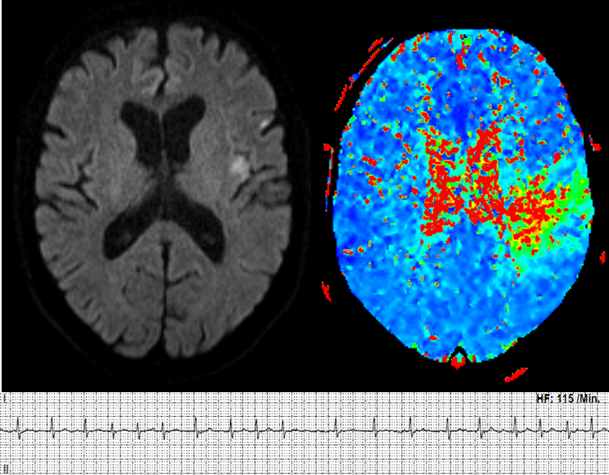Early versus Late initiation of direct oral Anticoagulants in post-ischaemic stroke patients with atrial fibrillatioN (ELAN) started with the recruitment in October 2017 with currently approximately 80 sites in Switzerland and European countries.
This pragmatic investigator-initiated international trial will add evidence to the best time of starting DOAC after ischaemic stroke in patients with atrial fibrillation. If earlier initiation of DOACs in patients with ischaemic stroke related to atrial fibrillation is shown to be safe and efficacious, this could have a major impact on better treatment adherence, length of hospital stay and patient outcome.
We used an opportunity to talk with Urs Fischer, Professor for Acute Neurology and Stroke (Extraordinarius) at the University Hospital (Inselspital), Bern and principal investigator of the ELAN trial (www.elan-trial.ch).
1. What is ‘atrial fibrillation’ or ‘AF’ and why is it important to know more about it?
Atrial fibrillation is a condition of the heart that is characterized by an abnormal heart rhythm. If you suffer from AF, the atria, two of the chambers in the heart, beat very rapid and irregular. Atrial fibrillation can be episodic or chronic and symptomatic or asymptomatic. It is a very relevant condition because people with atrial fibrillation have a higher risk of suffering from a stroke or a heart failure. Atrial fibrillation is very widespread around the world, especially in the elderly population and causes major mortality and morbidity.
2. What is your personal involvement with the subject of AF, how long are you interested in this subject?
I am currently working as a Professor for Acute Neurology and Stroke at the University Hospital Bern, Switzerland and I am very passionate to find new approaches to prevent and treat strokes. Stroke has a major impact on the quality of life of my patients and their relatives and one of the main causes of a stroke is AF. Therefore, AF needs to be detected and treated.
3. Is there a way to discover AF in time to prevent stroke?
Yes, AF can be detected by cardiac monitoring. Some patients complain about shortness of breath or an irregular pulse. However, it is not uncommon that atrial fibrillation is only diagnosed after the patient has suffered a stroke, especially when AF is asymptomatic and only occurring in episodes and not all the time. Missing these patients is a problem and improving the diagnosis in such patients is a challenge that occupies physicians around the world.
4. Is AF treatable and how?
Atrial fibrillation can be treated or rather managed in a number of ways. The most important approach in the management of AF is to prevent the formation of clots in the heart, which then can cause a stroke or an embolism in other parts of the body. If a patient with AF is at risk of suffering a stroke, anticoagulants (i.e. blood thinners) should be started by the treating physician. If atrial fibrillation is symptomatic by i.e. shortness of breath, cardiologists try to restore a normal heart rhythm. This can be achieved either with drugs or with (minimal invasive) surgery. If the patient is asymptomatic, anticoagulation and frequency control in case of tachycardia are the main goals of therapy.
5. In your opinion, why is the initiation of direct oral Anticoagulants in post-ischaemic stroke patients with atrial fibrillation important?
Post-ischaemic stroke patients are at a high risk of suffering a second stroke soon after the first event. This is called a recurrent stroke. Treatment with oral anticoagulants reduces the risk of a recurrent stroke significantly. Direct oral anticoagulants are the newest class of anticoagulants and compared to older ones, they are just as effective but safer. However, the time point when these drugs should be started after a stroke is unknown. Therefore, we have designed the ELAN trial (Early versus Late initiation of direct oral Anticoagulants in post-ischaemic stroke patients with atrial fibrillatioN (ELAN): an international, multicentre, randomised-controlled, two-arm, assessor-blinded trial; www.elan-trial.ch), in which we currently assess, whether anticoagulants should be started early or with a certain time delay after a stroke.
6. When did the research project ELAN started and what do you expect would change once the research is completed?
The first hospitals started recruiting patients in October 2017. After completion, the results of this trial will help us to understand more about the safety and the potential benefits of an early treatment start with direct oral anticoagulants compared to a later treatment start. The results will give physicians a scientific justification of when to start treatment. ELAN could possibly change the way how post-ischaemic stroke patients with atrial fibrillation are treated.
7. Who is funding this research and do you involve patients/ stroke support organisations in it?
ELAN is funded by the Swiss National Science Foundation and the Swiss heart Foundation. Furthermore, it is endorsed by SAFE, the Stroke Alliance for Europe.
About Prof. Urs Fischer
Urs Fischer is Professor for Acute Neurology and Stroke (Extraordinarius) at the University Hospital (Inselspital), Bern. He is chair of the Neurological Inpatient Department, co-chair of the Stroke Center Bern, and deputy director of the Clinical Trial Unit (CTU) of the University of Bern. He is a clinical researcher and his main research interest involves diagnosis, treatment and outcome of patients with acute neurological diseases. He is co-principal investigator of the SWITCH study (www.switch-trial.ch), principal investigator of the ELAN trial (www.elan-trial.ch) and co-principal investigator of the SWIFT DIRECT trial (www.swift-direct.ch). Urs Fischer is Secretary General of the European Stroke Organisation (ESO), treasurer of the Swiss Neurological Society (SNG) and co-founder the ESO ESMINT ESNR Stroke Winter School, which is regularly held at the University Hospital in Bern, Switzerland.





